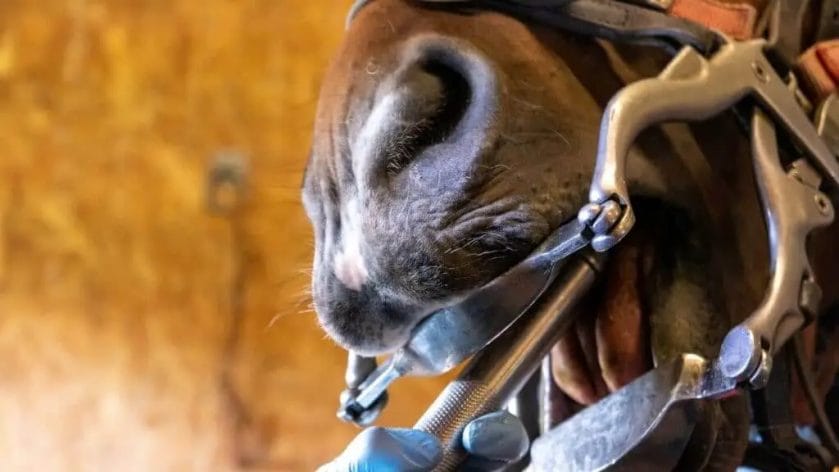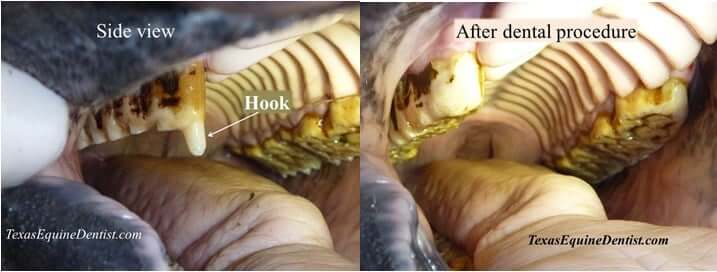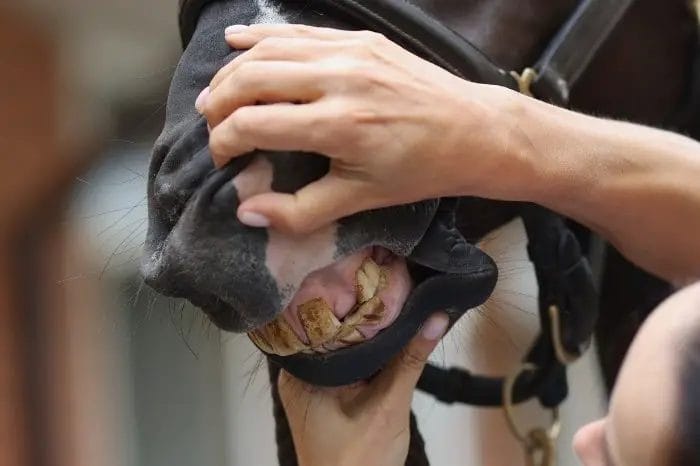While it is possible to float a horse’s teeth yourself, it is strongly recommended to have a professional equine dentist or veterinarian perform the procedure. Floating involves smoothing the horse’s teeth to prevent painful sharp edges, which can affect their ability to chew and perform properly. Without proper training and equipment, attempting to float teeth can lead to serious injury or damage to the horse’s mouth. Trusting an experienced professional will ensure the procedure is done safely and effectively, promoting your horse’s overall dental health.

Professional vs. DIY Horse Teeth Floating: Pros and Cons
Proper dental care is essential for maintaining the overall health and well-being of horses. One aspect of equine dental care is teeth floating, a procedure that involves filing down the uneven surfaces of the teeth to ensure a balanced bite. While this task can be performed by a professional equine dentist, some horse owners may consider taking on the task themselves. In this section, we will explore the pros and cons of professional horse teeth floating versus the DIY approach.
Professional Horse Teeth Floating
Many horse owners opt to hire a professional equine dentist to perform teeth floating for their horses. Here are some of the advantages:
- Expertise: Professional equine dentists undergo extensive training and have the necessary knowledge and skills to perform teeth floating accurately and effectively.
- Specialized Equipment: Professionals have access to specialized tools and equipment specifically designed for equine dental procedures, ensuring a high level of precision.
- Safety: Professionals understand the anatomy of a horse’s mouth and know how to navigate the procedure safely without causing harm or discomfort to the horse.
- Comprehensive Examination: Equine dentists often conduct a thorough oral examination before and after teeth floating, allowing for the detection and treatment of any underlying dental issues.
- Time Efficiency: Professionals are experienced and efficient, performing the procedure quickly and minimizing stress for both the horse and the owner.
However, there are also some potential drawbacks to consider when opting for professional horse teeth floating:
- Cost: Hiring a professional for teeth floating can be expensive, especially if it needs to be done regularly to maintain the horse’s dental health.
- Scheduling and Availability: Depending on the location and demand for equine dental services, it may be challenging to find a convenient appointment time or a professional in your area.
DIY Horse Teeth Floating
Some horse owners may choose to take on the task of teeth floating themselves. Here are some potential benefits:
- Cost Savings: Performing teeth floating on your own eliminates the need to pay for professional services, potentially saving you money in the long run.
- Control and Convenience: DIY horse teeth floating allows you to have full control over the procedure and the ability to perform it at your own convenience.
However, there are significant potential risks and challenges associated with DIY horse teeth floating:
- Lack of Experience and Training: Teeth floating requires a deep understanding of equine dental anatomy and proper technique. Without proper training, there is a risk of causing harm or injury to the horse.
- Inadequate Tools: DIY enthusiasts may not have access to the specialized equine dental tools and equipment that professionals use, which can compromise the effectiveness and accuracy of the procedure.
- Increased Risk of Complications: Without the expertise of a professional, there is a higher likelihood of overlooking or mishandling dental issues, leading to more significant problems in the long run.
- Legal and Ethical Considerations: In some regions, DIY horse teeth floating may be regulated or prohibited unless performed by a licensed professional. It is essential to familiarize yourself with the legal and ethical implications before attempting the procedure.
In summary, professional horse teeth floating offers the advantage of expertise, specialized equipment, and comprehensive care. However, it comes at a higher cost and may require scheduling accommodations. On the other hand, DIY horse teeth floating may be cost-effective and convenient, but it poses risks due to the lack of training, inadequate tools, and potential legal and ethical implications. Ultimately, the decision between professional and DIY horse teeth floating depends on the individual’s knowledge, skills, resources, and willingness to assume responsibility for the horse’s dental health.

Essential Tools and Techniques for Floating Horse’s Teeth Safely
Proper dental care is essential for maintaining a horse’s overall health and well-being. One crucial aspect of equine dental care is floating, which involves filing down the horse’s teeth to correct any irregularities or sharp edges. However, performing this procedure safely requires the use of specific tools and techniques. In this section, we will discuss the essential tools and techniques for floating a horse’s teeth safely.
1. Dental Examination Tools
Before beginning the floating process, it is crucial to conduct a thorough dental examination to identify any dental issues. The following tools are necessary for an accurate examination:
- Headlamp: Provides adequate lighting to visualize the horse’s oral cavity.
- Dental pick and mirror: Allows the dentist to examine and palpate the teeth and gums for any abnormalities.
- Mouth gag: Holds the horse’s mouth open for a clearer view during the examination.
- Dental chart: Used to record findings and document the condition of the horse’s teeth.
2. Power Tools
Power tools are commonly used during the floating procedure to remove excess material from the horse’s teeth. The following power tools are essential for safe and efficient floating:
- Power float: An electric or pneumatic device used to file down the horse’s teeth. It should be of high quality, well-maintained, and have adjustable settings for precision.
- Float blades: These attach to the power float and come in different shapes and sizes to suit various dental conditions. The blades must be sharp and properly sterilized before use.
3. Manual Tools
In addition to power tools, manual instruments are also used during the floating procedure. These tools allow for more precise work and finer adjustments. The following manual tools are essential:
- Float files: Hand-held files used to manually smooth and contour the horse’s teeth. They come in different sizes and shapes to address specific dental conditions.
- Speculum: A veterinary instrument that holds the horse’s mouth open during the floating process, providing better visibility and access for the dentist.
- Dental mirror and probe: Used to visualize and explore hard-to-reach areas of the mouth for thorough examination.
4. Sedation and Restraint Techniques
Proper sedation and restraint techniques are crucial for the safety of both the horse and the dental practitioner. Sedation allows the horse to relax, minimizing stress and discomfort during the procedure. The following techniques are commonly used:
- Injectable sedatives: Administered by a qualified veterinarian to induce sedation and relaxation in the horse.
- Physical restraint: Using a halter, lead rope, and stocks to secure the horse and prevent sudden movements that may cause injury to both the horse and the dentist.
5. Safety Equipment
When performing any dental procedure on a horse, safety should always be a top priority. The following safety equipment is necessary:
- Protective eyewear: Prevents debris and particles from entering the dentist’s eyes during the floating process.
- Protective gloves: Ensures hygiene and reduces the risk of cross-contamination.
- Dust mask or respirator: Filters out airborne dust and debris, protecting the dentist’s respiratory system.
- Sturdy footwear: Provides stability and protection against accidental slips or falls.
In summary, floating a horse’s teeth safely requires the use of specific tools and techniques. Dental examination tools, power tools, and manual instruments are essential for accurately assessing and correcting dental issues. Sedation and restraint techniques ensure the safety and comfort of the horse during the procedure. Additionally, the use of appropriate safety equipment protects both the dentist and the horse from potential hazards. By utilizing these essential tools and techniques, equine dental practitioners can effectively provide optimal dental care for horses.

4. Common Mistakes to Avoid When Floating Your Horse’s Teeth at Home
Floating your horse’s teeth at home can be a cost-effective and convenient option for maintaining your horse’s dental health. However, it is important to be aware of common mistakes that people make when attempting to float their horse’s teeth at home. By avoiding these mistakes, you can ensure that your horse receives proper dental care and avoid potential complications.
1. Insufficient Training and Knowledge
One of the biggest mistakes people make when attempting to float their horse’s teeth at home is a lack of proper training and knowledge. Floating teeth requires skill and expertise to avoid causing harm to the horse. It is important to receive proper training from a qualified equine dentist or veterinarian before attempting to float your horse’s teeth on your own.
Without the necessary knowledge and experience, it is easy to accidentally cause injury to your horse’s mouth, such as gum lacerations or damage to the tooth enamel. Additionally, without proper training, you may not be able to effectively identify and address dental issues that may require professional attention.
2. Using Improper Tools or Techniques
Another common mistake is using the wrong tools or techniques when floating your horse’s teeth at home. It is essential to use appropriate dental instruments specifically designed for equine dentistry. Using improper tools can increase the risk of causing injury to your horse’s mouth.
Additionally, using incorrect techniques can lead to ineffective floating or incomplete removal of sharp points on the teeth. This can result in ongoing dental problems or discomfort for your horse. It is crucial to learn the correct techniques and proper use of dental tools from a qualified professional before attempting to float your horse’s teeth at home.
3. Neglecting Regular Dental Check-ups
While floating your horse’s teeth at home can be beneficial, it should not replace regular dental check-ups by a qualified equine dentist or veterinarian. Neglecting regular check-ups can lead to undetected dental issues that may require professional intervention.
Professional dental examinations allow for a thorough evaluation of your horse’s oral health, including identifying and addressing any underlying dental problems. Regular check-ups also provide an opportunity to address any potential complications or issues that may require specialized treatment.
4. Improper Sedation or Restraint
Sedation and restraint are an essential part of floating your horse’s teeth to ensure their safety and comfort during the procedure. Improper sedation or restraint can lead to a stressful and potentially dangerous experience for both you and your horse.
It is crucial to consult with a professional to learn the correct sedation techniques and appropriate use of restraints during the floating process. This helps to ensure that the procedure is done safely and effectively, minimizing stress and discomfort for your horse.
5. Failure to Seek Professional Help When Needed
Finally, one of the most significant mistakes to avoid when floating your horse’s teeth at home is failing to seek professional help when needed. If you encounter any complications or issues during the floating process, it is important to reach out to a qualified equine dentist or veterinarian for assistance.
Ignoring or neglecting potential problems can lead to further complications and discomfort for your horse. Professional assistance can help address any issues, provide appropriate treatment, and ensure the overall well-being of your horse’s dental health.
In summary, floating your horse’s teeth at home can be a cost-effective option, but it is crucial to avoid common mistakes to ensure the safety and well-being of your horse. By receiving proper training, using appropriate tools and techniques, maintaining regular dental check-ups, practicing proper sedation and restraint, and seeking professional help when needed, you can effectively float your horse’s teeth at home and contribute to their overall dental health and well-being.
Signs that Indicate it’s Time to Float Your Horse’s Teeth: Expert Advice
As a responsible horse owner, it is important to be aware of the signs that indicate your horse may need a dental procedure called floating. Floating is the process of filing or rasping down the sharp edges and points that can develop on a horse’s teeth. This procedure is necessary to ensure that your horse can chew and digest its food properly, as well as to prevent potential dental issues.
So how can you tell if it’s time to float your horse’s teeth? Here are some expert advice on the signs to look out for:
- Difficulty chewing or dropping feed: If you notice that your horse is having difficulty chewing its food or dropping partially chewed food, it may be a sign that its teeth are causing discomfort. Sharp edges and points on the teeth can create painful ulcers or sores in the mouth, making it difficult for the horse to chew properly.
- Weight loss or poor body condition: Dental issues can lead to weight loss or a decline in body condition. If your horse is not able to chew its food properly, it may not be getting the necessary nutrients from its diet, resulting in weight loss or a decrease in overall body condition.
- Excessive salivation or drooling: If you notice that your horse is drooling excessively or has an increased amount of saliva, it could be a sign of dental problems. Pain or discomfort in the mouth can cause the horse to produce more saliva than usual.
- Bad breath or foul odor: Dental issues can also lead to bad breath or a foul odor coming from the horse’s mouth. This can be caused by infections or decay in the teeth, which may require dental attention.
- Head tossing or resistance to the bit: Horses with dental problems may exhibit behaviors such as head tossing or resistance to the bit. This can be a result of pain or discomfort caused by sharp points or uneven wear on the teeth.
- Unusual head tilting or chewing on one side: If you notice that your horse is tilting its head or chewing on one side more than the other, it could indicate dental issues. Uneven tooth wear or sharp points can cause discomfort, leading to these abnormal behaviors.
If you observe any of these signs in your horse, it is important to consult with a qualified equine dentist or veterinarian. They will be able to examine your horse’s teeth and determine if floating is necessary.
Regular dental care is essential for maintaining your horse’s overall health and well-being. Floating should be done at least once a year for most horses, while some may require more frequent dental procedures. It is important to follow the recommendations of your equine dental professional to ensure that your horse’s teeth are in optimal condition.
In summary, being aware of the signs that indicate it’s time to float your horse’s teeth is crucial for maintaining its dental health. Difficulty chewing, weight loss, excessive salivation, bad breath, head tossing, and unusual head tilting or chewing behaviors are all potential signs of dental issues. Consulting with a qualified professional and scheduling regular dental check-ups will help ensure that your horse’s teeth are properly maintained and free from discomfort.
FAQs
Can I float my horse’s teeth myself?
No, it is not recommended to float your horse’s teeth yourself. Floating, which is the process of filing down the sharp edges of the teeth, should be done by a qualified veterinarian or equine dentist. They have the necessary training and equipment to ensure the procedure is done safely and effectively.
Conclusion
In conclusion, while it may be tempting to float your horse’s teeth yourself, it is highly recommended to leave this task to a professional equine dentist. Floating a horse’s teeth requires specialized knowledge, skills, and tools to ensure the procedure is done correctly and safely. Attempting to float teeth without the proper training and experience can lead to serious complications and harm to your horse’s oral health.
By entrusting this important task to a qualified professional, you can ensure that your horse receives the necessary dental care to maintain its overall health and well-being. Remember, investing in professional equine dental services is a small price to pay for the long-term health and performance of your beloved horse.
